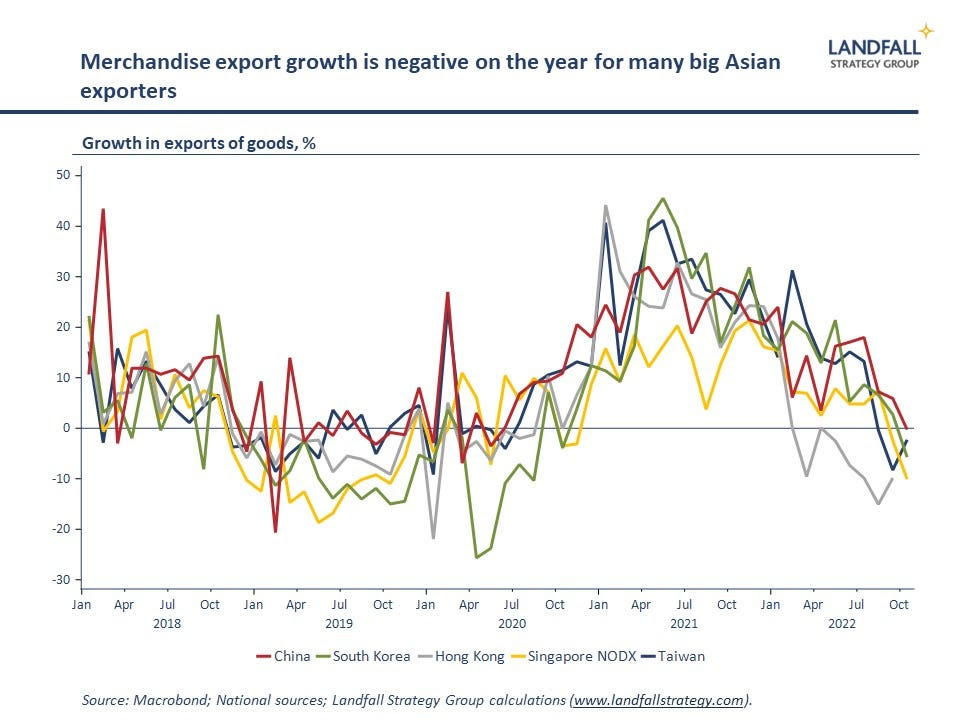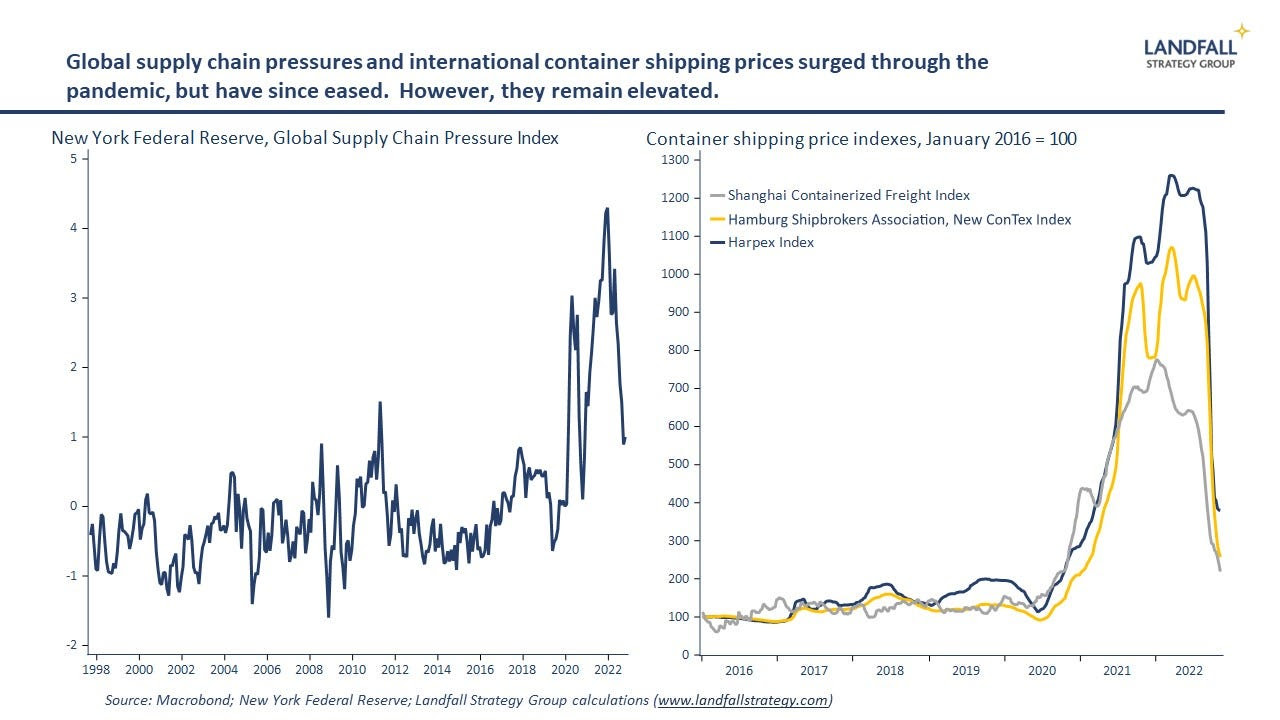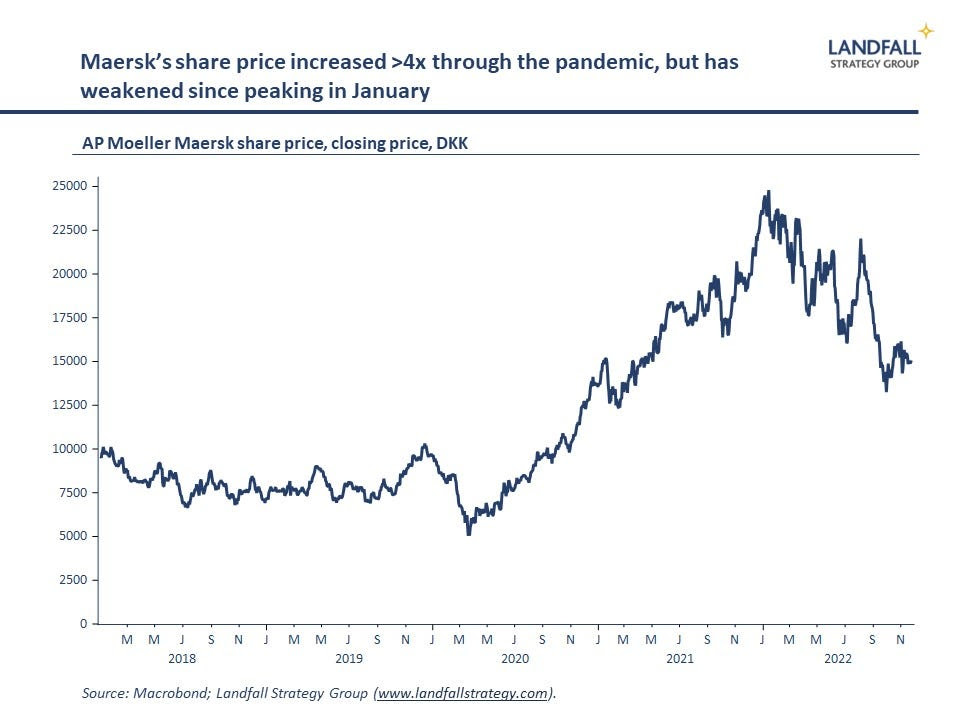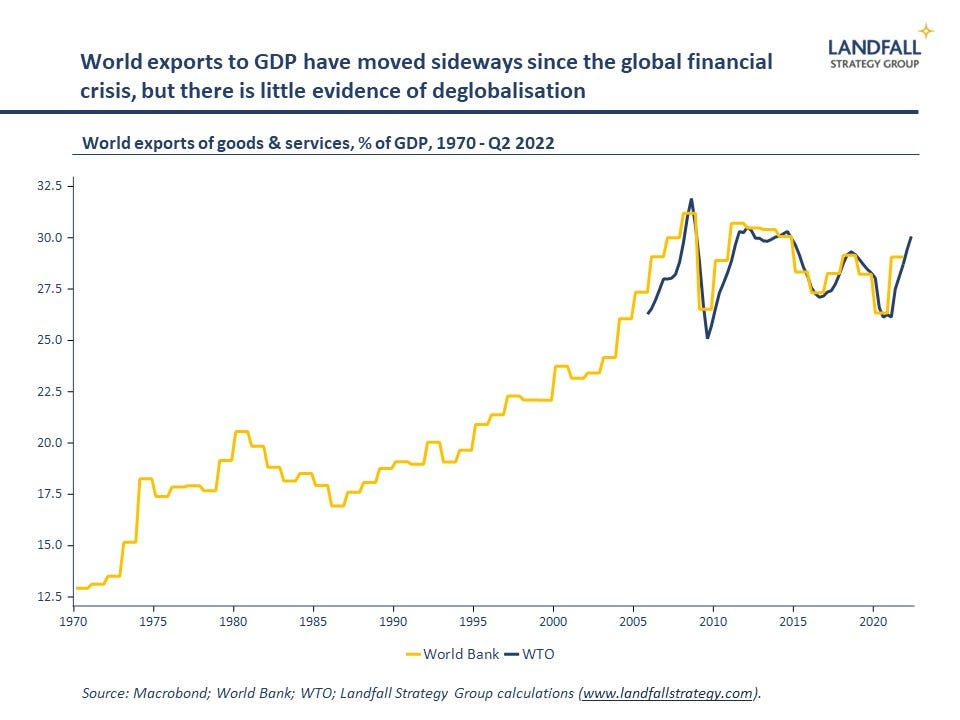By David Skilling*
After resilient growth through the pandemic, world trade flows are slowing – reflecting a slowing global economy. And as the G20 meetings in Bali last week demonstrated – as well as other recent corporate and political developments – firms and governments are continuing to position for a reshaped global economic and political system.
But the ebbing global economic tide may make some of these structural shifts more challenging to navigate.
Global slowdown
Global trade flows are beginning to weaken. Monthly growth in the CPB world trade series has been decelerating through 2022, although it remains positive (to August). More recent estimates from the Kiel Institute also show slowing, but still positive, growth.
However, recent data for many Asian exporting economies, manufacturing powerhouses that provide a useful bellwether for the strength of world trade, paint a weaker picture. South Korean exports are contracting, as are exports from Taiwan, Hong Kong, and Singapore. And China’s imports and exports came in below expectations in October.

Across the broader small advanced economy group, export growth has turned. And the WTO is picking markedly lower trade growth (1%) next year.
This changed demand profile is reflected in global supply chains. Significant supply chain disruptions were seen through the pandemic. Strong growth in demand for durable goods contributed to massive increases in international shipping prices and delays. But these pressures have unwound significantly, with prices, congestion, and delays down sharply.

This is partly a reflection of post-Covid disruptions easing, but importantly also reducing demand as the global economy slows. Indeed, AP Moeller Maersk – the Danish shipping company – which had recorded record profits through the pandemic is forecasting a weaker outlook on contracting global container demand. Its share price is a useful barometer of the expected strength of globalisation.

On the plus side, there will be some support from a weakening US dollar. After a period of substantial US dollar appreciation (on higher rates, safe haven flows, and positive external balance dynamics), the looming end of the Fed rate hiking cycle is taking pressure off the US dollar. A weaker US dollar is generally associated with stronger world trade growth.
These slowing global trade flows are not evidence of deglobalisation: world exports as a share of GDP are holding up well. And the decline in forecast trade growth largely reflects weakening GDP growth. The OECD’s latest Economic Outlook, released this week, forecast weaker GDP growth across the OECD (0.8%) and the world (2.2%) in 2023.

Competing, but more quietly
But the underlying shape of global flows is shifting – driven by changing economics, geopolitical rivalry, and domestic politics.
The single most important relationship in the world is that between the US and China. The G20 meetings in Bali last week lowered the temperature of this relationship, with the first face to face meeting between Presidents Biden and Xi (both fresh off the back of political successes at home).
Although these US/China conversations did not alter the fundamental trajectory of the relationship, it re-opened channels of communication and served to develop some guardrails. This is valuable given the very high level of economic interdependence between the US and China: a hard, unmanaged rupture in relations would impose substantial costs.
Indeed, a recent report by the Rhodium Group (reportedly prepared for the State Department), estimated that a Chinese blockade of Taiwan would generate annual direct costs of $2.5 trillion (~2.6% of current world GDP). Substantial additional indirect costs would be likely. This would be catastrophic for the global economy.
US/China trade relations are at close to record levels despite the geopolitical tensions. But the strategic rivalry between the US and China will continue to play out on economic, financial, and technology domains, as well as on military grounds. The sweeping semiconductor restrictions imposed by the US on China are one example.
And this week Apple announced that it would be sourcing its chips from a TSMC facility in Arizona (currently being built), supported by US industrial policy support. This is part of an ongoing diversification strategy for Apple: India and Vietnam are also becoming more important production platforms. Reshoring and measure of decoupling is underway, even if gradual and sector-specific.
But as discussed in my previous note, the emerging global context is more complicated than a simple bipolar world. Also at the G20 meetings, the Australian PM met with President Xi with a view to stabilising relations. Australia wants China to lift sanctions on a wide range of Australian exports. Italy announced plans to expand economic relations with China. And the German Chancellor was in Beijing earlier this month with a business delegation.
Many Western economies are actively balancing economic and political objectives, trying to carve out strategic space where possible. For example, the Dutch Government is under pressure from the US to limit ASML’s engagement with China – but have warned that they will not simply copy US measures. Indeed, agreements were signed between the Netherlands and South Korea last week on semiconductors, another country that is wary of direct US/China technology competition.
And there are emerging poles in the global economy that are trying to preserve flexibility. For example, Qatar has just signed the longest ever LNG supply deal (27 years) with China’s Sinopec. And there are deepening links between many Gulf states and China, with some change in the strategic posture of countries like Saudi Arabia. More generally, a range of middle powers – from Indonesia to India – are looking to position themselves in a multipolar world.
Globalisation in a zero sum world
Appropriately as Thanksgiving weekend is being celebrated, there are some positives in all of this. The G20 and APEC meetings made progress on managing some of the political risks to the global economy, managing to issue closing statements with a measure of consensus. [And encouragingly, the G20 meeting was able to agree on wording to condemn Russia’s invasion of Ukraine; Russia is increasingly ostracised.]
This is welcome, but should not be over-interpreted. The logic of strategic geopolitical competition remains intact, even if economic tail risks have been managed. Politics is back, and big powers are moving away from the support of an open, rules-based system to a more discretionary system in which they can directly advance their interests.
Aggressive industrial policy is just one example of these big power tendencies, which will lead to a more fragmented global economic system. The US, China, and the EU (to a lesser extent) are competing for control of the commanding heights of the C21 global economy.
Other economies are looking to balance geopolitical pressures (and the need to make choices), with the imperative to capture value from economic and trade relations. Performing in this world will be much more demanding than in the relatively depoliticised global economy of the past few decades. This is particularly the case for small advanced economies, deeply exposed to globalisation and geopolitical rivalry. Small economies – and firms – will need to win market share by strengthening competitive advantage, and successfully navigating geopolitical cross-currents.
‘It's only when the tide goes out that you learn who has been swimming naked’, Warren Buffett
These structural shifts in the global economy have accelerated over the past few years. But the post-Covid surge in world trade may have covered over some of the structural shifts underway in the global system. Weaker/negative growth in global trade flows will add zero sum dynamics to global competition. An ebbing global economic tide adds complexity and risk to what is already a challenging world.
*David Skilling ((@dskilling) is director at economic advisory firm Landfall Strategy Group. The original is here. You can subscribe to receive David Skilling’s notes by email here.
34 Comments
The mask is off: WEF's Klaus Schwab declares China a 'role model'
According to Fox News:
World Economic Forum founder and Chair Klaus Schwab recently sat down for an interview with a Chinese state media outlet and proclaimed that China was a "role model" for other nations.
Schwab, 84, made these comments during an interview with CGTN’s Tian Wei on the sidelines of last week’s APEC CEO Summit in Bangkok, Thailand.
Schwab said he respected China’s "tremendous" achievements at modernizing its economy over the last 40 years.
"I think it’s a role model for many countries," Schwab said, before qualifying that he thinks each country should make its own decisions about what system it wants to adapt.
"I think we should be very careful in imposing systems. But the Chinese model is certainly a very attractive model for quite a number of countries," Schwab said.
Audaxes you know Fox News is an oxymoron right?
China: Send to us the huddled masses of your most polluting industries, and we will absorb their IP and give them shelter from environmental regulation.
Bunch of other emerging economies: We'll take a piece of that action!
The west simplely does not have the wisdom and any weaponry superiority to counteract China any more.
What evidence do you have to support such fanciful claims?
... I do wonder who's government tells bigger porkies , his . . or ours ....
Either/or , both the PRC & NZ suffer from leaders who openly BS their citizens ...
Don't bother, he makes a provative claim and never elaborates when people ask follow up questions.
He, she, they or it is simply a CCP troll.
... you brag that China has weapons superiority ... does this suggest they intend attacking other countries ? ... Putin tried that , and its blown up in his face ...
Wisdom is shutting the F up , not letting others see wotcha got ...
Thanks for the Saturday morning laughs.
Almost as laughable as England’s effort in the World Cup this morning.
The biggest larf was watching a woeful Costa Rica get smashed 7 - 0 by Spain ... given that CRC knocked our team out of qualifying .... the All Whites would've put up a better performance than that against Spain ...
Two very different claims. What does superior weaponry mean? The ability to destroy like Genghis Khan? Would anyone wish to boast about it?
The argument for wisdom is far better. By wisdom you mean lifting people out of total despair and poverty into a high standard of living where many can visit the world as tourists learning what to avoid and occasionally what to emulate then you have a point. China is not unique (Japan, Taiwan, Korea for example) but China has done it with a far larger population. China has been setting an example to other large countries such as Indonesia, Pakistan, Nigeria, Russia. The weakness of the argument is how did China descend to so low a starting point under Mao's leadership of the CCP; what limits are there on China's current leaders to prevent a repetition of 'the Great Leap Forward' and his 'Cultural Revolution'?
Pakistan and wisdom? Those are two words never spoken in the same context.
Political crises in the country has been a norm since its formation.
https://www.overshootday.org/newsroom/country-overshoot-days/
"Degrowth" of the global North is an ecological necessity for avoiding disaster.
"We" need to lose the fast apparel, advertising, tourist air travel....and live within the planets resource replacement capacity.
Health care, transport, food are the actual wellbeing essentials.
https://www.aljazeera.com/program/all-hail/2022/11/24/our-obsession-wit…
I'm pretty sure that air travel is a form of transport.
... speaking of which , why did our illustrious leader take an emissions belching old airforce plane to visit the 800 voters in the Chathams ... rather than support the local airline & get a seat on their commuter plane which flies daily ?
The hypocrisy of Jacinda is staggering ...
I'm the people's poet, Gummies - not J Dog's spokesman. They would have flying in cargo too? I'll Google it and report back.
Oh the humanity Gummy ..
... kindness , humanity would've been if she'd visited the distraught family & colleagues of the dairy guy murdered in Sandringham ... in her electorate ...
PRIME MINISTERS OFFICE PRESS RELEASE
https://www.newshub.co.nz/home/new-zealand/2022/11/livestream-prime-min…
48 hours late ... but , she got there eventually ...
I was very surprised given the CHCH mosque handling. Every murder is a tragedy for the family of the murdered, be it 1 or 51.
It looks bad, it looks like she hesitated due to the perception that Labour is soft on crime and perhaps this Murder was a result of that softness. maybe it was only 1 not 51.... maybe ?
She looked like a leader for all of NZ who cared back in Christchurch, but by pausing here, she looks calculating, is this going to to have an impact on Nov 23.... It looks like now she is thinking of her position being viewed as Labours Leader.
It was her own electorate. It looks like she does't care at an Electorate level. It's damming and it's a turning point in her legacy. her political advisors where damned if they did and damned if they didn't..... It looked like Morrison when he went on holiday vs view the impact of the bushfires.
It looked weak.
Yet if she runs again,that same electorate will vote her back in.
Round 3 for Xi begins with a smile on his dial. Beware the dragon in a nice suit. He still bites.
Oh he’s looking a bit pathetic now trying to turn on the charm. I don’t think the West is quite as gullible as it previously was with China.
Nor are lots of the people in China who have been locked up and beaten all to control covid
Big retail discounts coming next year due to slow down and over stock.
Already happening in South East Asia with nice to have Western products like women's skincare. Entry level priced brands are still selling but niche and premium brands are being discounted in an effort to to meet sales targets. Eco Store opened an outlet in Vietnam 2 weeks ago. It will fail in my opinion.
I like some of your links but not sure about some also Audaxes, this is a not sure one Bro,
after reading some of the comments. Maybe some sources are not worth reading.
Germany needs to play a place between China and the US. The US has been looting and exploiting Europe since the end of the Second World War. Germany should lead Europe away from both the United States and China.
Agreed, Europe runs much better when Germany leads it.
No, wait, I think we've figured out why the US has so much influence.
Big protests breaking out around China. Xi is screwing up big time.

We welcome your comments below. If you are not already registered, please register to comment
Remember we welcome robust, respectful and insightful debate. We don't welcome abusive or defamatory comments and will de-register those repeatedly making such comments. Our current comment policy is here.